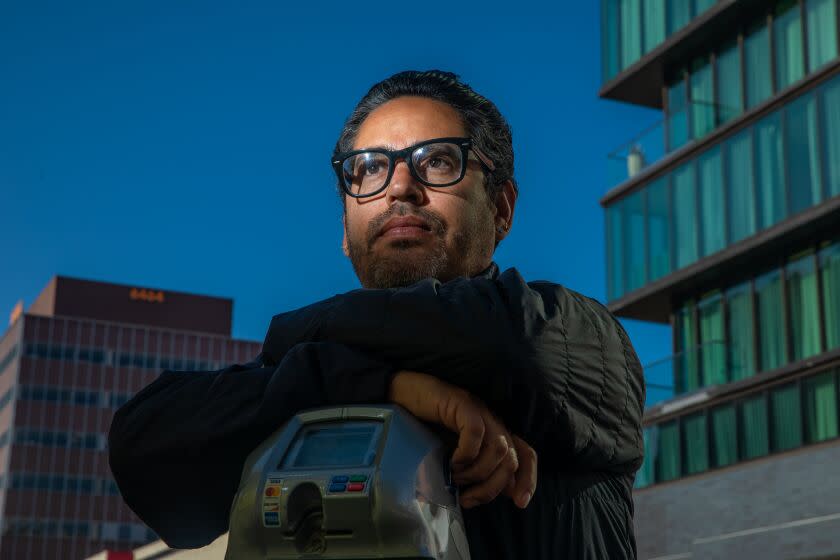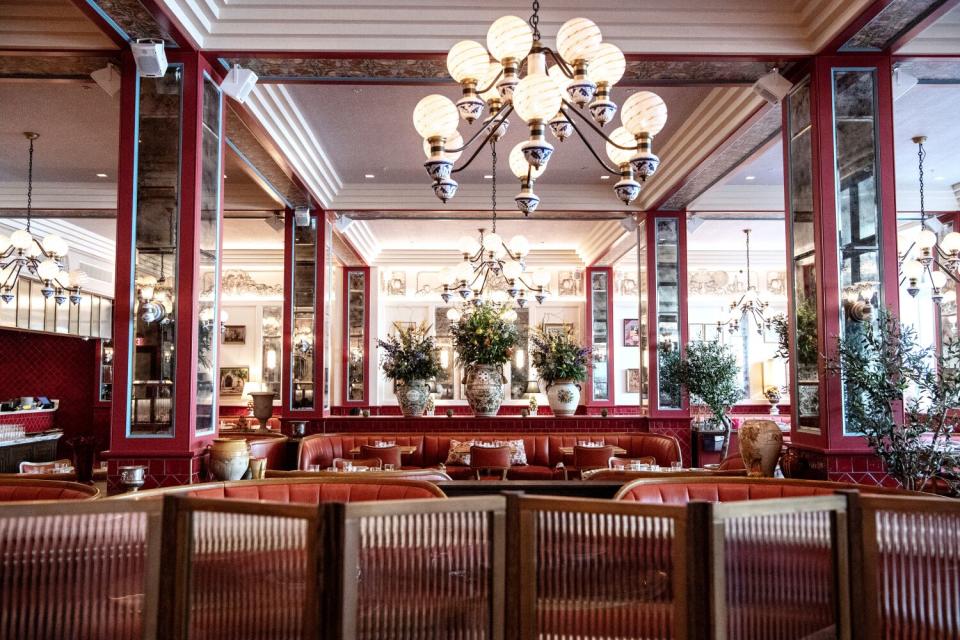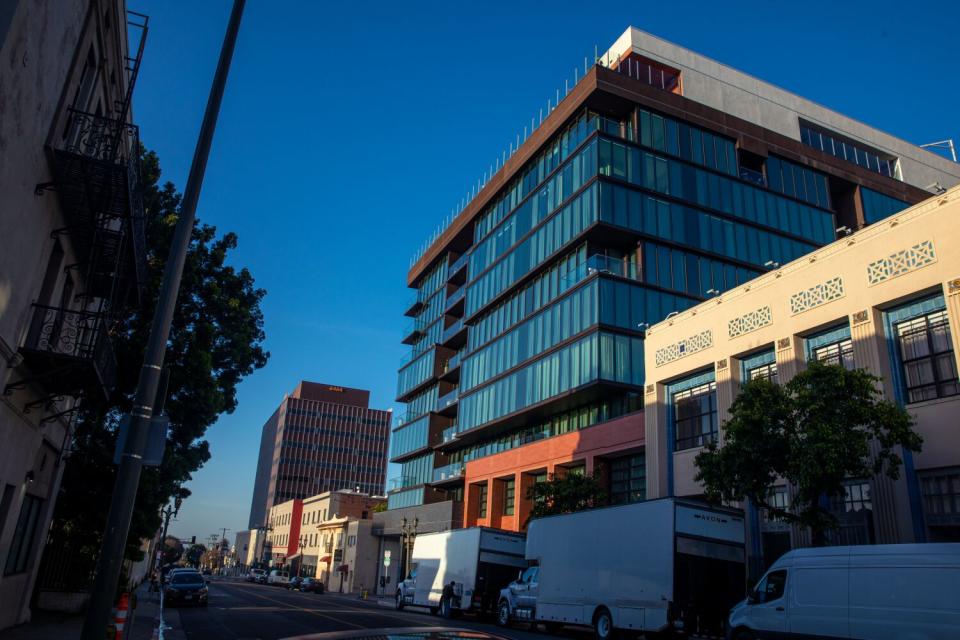City investigating Hollywood restaurants for allegedly keeping service fees, stiffing workers

When Earl Witron landed a job as a server in the summer of 2021 at the Thompson, a new World of Hyatt luxury hotel, he was “excited," he said, "to be part of something huge in Hollywood.”
He’d make only $17.50 an hour at the hotel's rooftop restaurant the Terrace, which offers its well-heeled patrons sweeping views of the Hollywood Hills. But, he said, managers promised that he and his co-workers would share in a 5% service fee tacked on to each check, "in support of health benefits to our staff," as the bill's explanation read.
Yet the 40-year-old said he never saw that money reflected in his compensation. When he questioned management about how the 5% service fee was allocated, he was given confusing answers or simply rebuffed.
“I was just living paycheck to paycheck,” said Witron, 40, who is now a runner at the Beverly Hilton. “I fell behind financially. I still haven’t recovered.”
This 5% service fee attached to customer restaurant bills is at the heart of an investigation launched by the Los Angeles city attorney’s office, and it involves some of the city’s most celebrated restaurants at the adjacent Thompson hotel, Tommie hotel and Citizen News building: Mother Wolf, Ka'teen, Mes Amis, Bar Lis and the Terrace.
Read more: 'Do y'all think tipping culture has gotten out of control?' Inside our evolving tipping dilemma
The city attorney is examining whether Ten Five Hospitality — the group that operated the five restaurants at the time of the allegations — violated an ordinance for allegedly keeping the entirety of the 5% service fee they charged to customers instead of distributing it to workers, according to an April 6 letter from Deputy City Atty. Joshua L. Crowell.
City officials asked Ten Five Hospitality, the hotels and restaurants for a response and numerous documents, including any evidence that would demonstrate workers benefited from the fee. The city attorney's office is also investigating allegations that at least two workers at the Terrace were fired after speaking out about the service fee.
No Ten Five Hospitality executives were made available for comment. A spokesperson provided a prepared statement, which read: “The Wellness Fee, which is explained clearly on all customer bills, enables the company to provide an above-market employee package including a robust medical, dental & vision insurance program, 401(k) benefit offering and better working conditions for all employees.”
The spokesperson declined to answer any other questions about the allegations in the city's letter.

Requesting an investigation
Tipping and service fees are becoming a flashpoint in the restaurant and hospitality industries. Healthcare-related service fees began gradually popping up on diners' bills in the last decade but became ubiquitous after the COVID-19 shutdowns. The tacked-on fees came amid a wave of empathy and gratitude for service workers at a moment when the future of restaurants seemed in doubt.
But for diners, the fees have become a source of confusion, leading some to tip less, under the impression that the tacked-on fee goes directly to their servers. Workers who prepare and serve food and drinks and bus tables typically rely on gratuities as part of their take-home wages.
Where these service charges actually wind up has remained murky.
In California, courts long held that mandatory charges cannot be considered gratuities under the labor code. That changed in 2019, when the law on service charges became clearer in the San Francisco case O'Grady vs. Merchant Exchange Productions Inc. In that case, a state appeals court ruled that service charges belonged to the employees under California law if customers could reasonably be led to believe the charges are tips. The ruling applies to all food and beverage establishments.
That ruling was tested as recently as April 19, when a San Francisco judge ruled in a nonjury trial that a Marriott hotel in downtown San Francisco must pay around $9 million in withheld service fees to staff who served food and drinks at banquets.
The case pivoted on whether such fees are reasonably considered by customers to be gratuities. In April 2017, the San Francisco hotel began expressly telling banquet diners that the tacked-on fees did not constitute gratuities, freeing itself from future liability.
Shannon Liss-Riordan, the plaintiff's lawyer in the Marriott case, said the verdict was the first on the issue in California. "I expect that is now going to lead to a lot of enforcement and employees now recognizing their rights," she said.
Liss-Riordan, also the plaintiff's attorney in the 2019 San Francisco case that set the precedent in California, has won similar cases in Hawaii and Massachusetts. She has lawsuits pending against other hotels in San Francisco and other places in California.
In L.A., city prosecutors appear to be focusing their inquiries on extra service charges on restaurants located inside hotels, where current laws are clearer on gratuities. The definition of "hotel" in the L.A. ordinance covers restaurants that are contracted or leased premises that are connected to or operated in hotels, such as the Terrace or Mother Wolf, according to the L.A. city attorney letter.
L.A.'s ordinance states that service fees cannot be retained by a hotel employer but must be paid in their entirety to the hotel worker performing services for the customers from whom the service charges are collected. The ordinance also mandates that no part of these amounts may be paid to supervisory or managerial employees, and that the service fee must be paid to the hotel workers equitably.
Steve Garrett, Jae Redlich and Jazelle Merritt, all former servers at the Terrace, said that when they brought up the discrepancies and asked questions about the 5% service fee in employee meetings, management gave them answers that didn’t make sense. A human resources representative told them it offset the cost of the healthcare premium for full-time employees, the workers said. Dan Daley, principal at Ten Five Hospitality, told them the service fee was intended to shore up losses at the restaurants due to the COVID-19 pandemic.
Daley did not respond to requests for comment.
Garrett, Redlich and Merritt would go on to file an unfair labor practice charge with the National Labor Relations Board, alleging that management either terminated or forced them to resign after they raised questions about the application of the service fees. A charge is a request for the government board to investigate and decide whether the evidence is sufficient for it to pursue a case against the employer.
At this point, no suit or charges have been filed; the allegations are still under investigation. Unite Here Local 11 is helping the Hollywood workers pursue their case.
Read more: L.A.-area restaurants adding healthcare surcharge to cover workers
It is unclear whether the star chefs most associated with the restaurants named in the city's letter — including Evan Funke at Mother Wolf, Wes Avila at Ka'teen and Lincoln Carson, formerly of Mes Amis — were aware of the workers' concerns or attempted to resolve their questions. Funke and Avila, two of the best-known and admired chefs in L.A., did not respond to multiple requests for comment.
Even before the allegations, the restaurants were caught in a messy tug-of-war between Ten Five Hospitality and Relevant, the developer of the hotels and the Citizen News building next-door that houses Mother Wolf, known for its Roman-style pastas and one of the most sought-after reservations in the city. At one point, both entities claimed control over the properties, according to a report in Eater LA.
Read more: Column: We should pay more to eat in restaurants
Chef Carson, who left Mes Amis in December, said he was aware of the service charge at the restaurant but believed “the money was distributed properly.”
Carson entered into a contract with Ten Five Hospitality to develop the highly lauded French restaurant and also worked at the Terrace for some time before Mes Amis opened. He said he served as a consultant and wasn’t there for the day-to-day financial accounting of the restaurants.
“I’m disappointed for all the people who put in so much of their hard work to build what was supposed to be something very special,” he told The Times. “It’s disappointing that this is what’s coming out.”
The city attorney's office declined to discuss Crowell's letter. The office also declined to disclose whether it has sent letters to any other restaurant groups in the city over service fees.

In interviews, several former and current Ten Five Hospitality employees said they found themselves in a distressing financial loop. Many workers didn’t qualify for the company’s medical program because they didn’t work full-time. And, they said, if they had qualified, the program was financially out of reach for them.
Read more: Why it's harder than ever to run a restaurant in Los Angeles
Witron, Redlich, Merritt and Garrett said they are still dealing with the aftermath of working at the Terrace. They all described mental angst and financial loss — falling behind on bills and rent. Three of the four said they likely won’t return to the restaurant industry.
“It’s horrible. It’s so dehumanizing,” Redlich said. “Everything on the surface level was kept to a certain appearance. It’s like when you take all the dirt in the house, all that mess, and you just put it under the rug. And, yeah, it looks clean, but just don’t look under the rug. That’s what it was like working there.”
Ten Five Hospitality faced a May 12 deadline to respond to the requests in the deputy city attorney's April letter. Both entities said Monday they were in communication but declined to elaborate.
This story originally appeared in Los Angeles Times.

